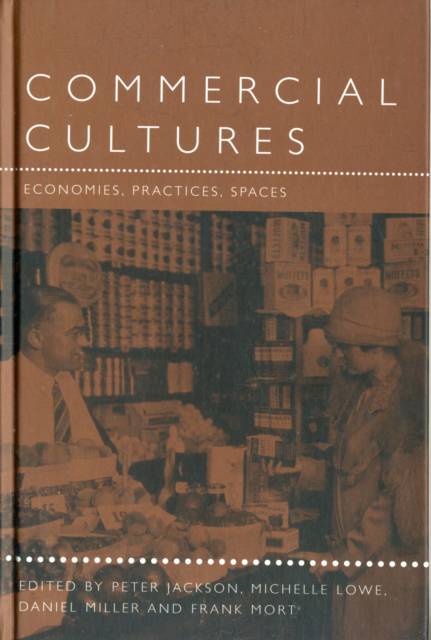
Door een staking bij bpost kan je online bestelling op dit moment iets langer onderweg zijn dan voorzien. Dringend iets nodig? Onze winkels ontvangen jou met open armen!
- Afhalen na 1 uur in een winkel met voorraad
- Gratis thuislevering in België vanaf € 30
- Ruim aanbod met 7 miljoen producten
Door een staking bij bpost kan je online bestelling op dit moment iets langer onderweg zijn dan voorzien. Dringend iets nodig? Onze winkels ontvangen jou met open armen!
- Afhalen na 1 uur in een winkel met voorraad
- Gratis thuislevering in België vanaf € 30
- Ruim aanbod met 7 miljoen producten
Zoeken
Commercial Cultures
Economies, Practices, Spaces
€ 271,45
+ 542 punten
Omschrijving
Why do fashion houses pay exorbitant rents for retail space in London and New York from which they sell very few clothes? Why are some mothers happy to buy and sell children's clothes from charity shops and thrift stores while others insist on the latest brand names for their children? What does the commercial success of men's lifestyle magazines tell us about contemporary gender relations and identities? This book provides answers to these and other questions about contemporary commercial culture through historically specific, theoretically informed, empirically grounded interdisciplinary research.From shopping malls, supermarkets, and fashion retailers, through the marketing and consumption of food, books and magazines, to sex pics on the internet, contributors overturn the assumption that it is commerce that works by logical economic models while 'culture' is invoked to explain the behaviour of the irrational consumer. In proposing a new agenda for understanding the complex relationship between commerce and culture, the book focuses on the point of articulation between commercial enterprises, which are designed to sell goods, and consumers, who purchase goods, to arrive at a broader understanding of the commercial cultures within which both enterprises and consumers operate.Spanning history, geography, business studies, sociology and anthropology, contributors work in a positive and complementary fashion to give the kinds of insights into the economies, practices and spaces of commercial culture that single disciplines rarely achieve.
Specificaties
Betrokkenen
- Uitgeverij:
Inhoud
- Aantal bladzijden:
- 224
- Taal:
- Engels
- Reeks:
Eigenschappen
- Productcode (EAN):
- 9781859733776
- Verschijningsdatum:
- 1/10/2000
- Uitvoering:
- Hardcover
- Formaat:
- Genaaid
- Afmetingen:
- 156 mm x 234 mm
- Gewicht:
- 589 g

Alleen bij Standaard Boekhandel
+ 542 punten op je klantenkaart van Standaard Boekhandel
Beoordelingen
We publiceren alleen reviews die voldoen aan de voorwaarden voor reviews. Bekijk onze voorwaarden voor reviews.










